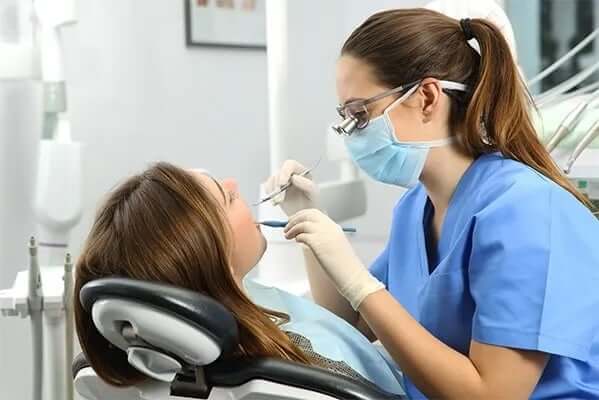Our highly experienced team can help restore your beautiful smile. Call Us today! Friendly team and affordable dental implants in Chattanooga to get you smiling. Dr Mark Dill and staff at Nooga Dentistry are there to provide quality services to our patients.

Reason to Consider Dental Implants
- Replace a missing tooth without the need to touch surrounding teeth
- Replace multiple missing teeth
- Provide support and stability to full upper or lower dentures
- Provide support for a partial denture
- Enhance chewing ability and comfort
- Gain confidence while smiling, talking and eating
- Improve your overall appearance
- Regain self confidence
What does it mean when we say dental implant

It means that a metal post made of titanium is surgically placed in the jawbone to replace a portion of the root of a missing tooth. After placing the dental implant in the jawbone, an artificial tooth is placed on the implant leaving a natural tooth look. Therefore, dental implants are the best solution to having removable dentures.
At Nooga Dentistry in Chattanooga Dr Mark Dill can perform dental implants on a single tooth or multiple teeth. Since dental implants look like natural teeth, they are the most preferred tooth replacement option in our Chattanooga dental office. Many of our patients love this method of replacing lost teeth. A dental implant consists of a porcelain replacement tooth anchored to a titanium foundation. The titanium post is first placed in the jaw bone. When it heals and bonds to the bone, the porcelain tooth is attached to the top of the post. Our patients feel like they have never lost a tooth at all.
To make an appointment to discuss dental implants in Chattanooga please contact Nooga Dentistry at (423) 592-7676.
Frequently Asked Questions About Dental Implants
What Are Dental Implants?
Dental implants are akin to screws that replace a missing tooth by being anchored into the jawbone. While it may seem that this process would be painful, it's typically not, as there are few nerves in the jawbone. The procedure involves making a small incision in the gums and creating a hole in the bone where the implant is then placed. It usually takes less than six months for the implant to heal and be ready for a tooth to be added. The implant replaces the root of the tooth, not the part used for chewing, making it a two-step process. Once restored, the implant functions like a natural tooth.
Who Are The Ideal Candidates For Dental Implants?
Dental implants are recommended for patients with missing teeth, especially when there are no other feasible solutions besides removable options. An implant is fixed and does not move, providing the feeling, appearance, and functionality of a natural tooth.
What Are The Advantages And Disadvantages Of Dental Implants?
The advantages of dental implants are their strength and resistance to decay, owing to the fact they're made of non-biological material, not tooth material. While the current material of choice is titanium, this may change in the future. The main downside is their susceptibility to periodontal disease, similar to natural teeth. However, implants have a very long lifespan.
What Is The Process Of Getting Dental Implants?
The dental implant process involves four main steps. Firstly, the natural tooth, if present, must be removed. Secondly, the bone might need preparation, which could involve a bone graft. This fills the hole left by the removed tooth with grafting material to encourage healthy bone growth. Thirdly, the implant is placed and given time to heal, usually up to six months. Fourthly, a tooth is added to the implant for chewing functionality.
What Does A Dental Exam For Implants Involve?
A dental exam for implants involves assessing the health of your gum tissue and bone. We look for adequate, healthy bone to place the implant and any anatomical features, such as nerves, bone anomalies, or sinus issues for top teeth.
How Does Medical History Influence The Implant Process?
Medical history is also important as it can influence healing around the implant. Factors like radiation or chemotherapy to the head and neck, diabetes, smoking habits, blood pressure, and bleeding tendencies must be considered to avoid complications during the implant process.
How Is Treatment Planning Done For Dental Implants?
When planning your treatment, your dentist will examine your mouth, noting the teeth you have and those you're missing, including those that may need replacement. They'll take x-rays and ensure your bone and gums are healthy and spacious enough for the implant. The goal is to create a treatment plan that provides a balanced chewing ability on all sides of your mouth.
What Are The Steps In The Implant Placement Process?
For patients curious about the implant placement process, the steps include tooth removal, jawbone preparation with bone grafting if necessary, implant placement, bone growth and healing, addition of an abutment (a component that protrudes from the gums and connects to the implant), and finally, placement of the artificial tooth (crown) over the abutment. This process results in a natural-looking and feeling tooth with a highly cosmetic appearance and excellent long-term prognosis.
What Is The Difference Between Removable And Fixed Solutions?
Patients often ask about the difference between removable and fixed solutions. Fixed restorations, which remain in your mouth and aren't removed at night, feel more like natural teeth. While removable options can provide chewing ability, they do not offer the same quality of experience as natural teeth or fixed solutions. As such, fixed restorations are the closest you can get to natural teeth.

